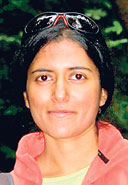Hemamala Karunadasa is yet
another Sri Lankan to be proud of. Working with two other American scientists — Christopher Chang and Jeffrey Long — they have found the key to cheap generation of hydrogen, a quest undertaken by many scientists the world over.
Hemamala and her collegues have discovered an inexpensive metal catalyst that enables generation of hydrogen in large volumes from water and have accomplished a task that has the potential to bring about a major change to the environment.
 |
| Hemamala Karunadasa |
Born in Colombo and having done her studies in CMS Ladies’ College, Hemamala went to the US and did her degree at Princeton University. She later obtained her PhD in Chemistry from Berkeley at the University of California.
She along with her co-workers has been working for two years on producing a catalyst that facilitates the generation of hydrogen. “I have worked with molybdenum complexes for a project based on molecular magnets for about five years. Then we noticed its unusual reactivity with water. I have been working on the catalysis project for about two years now,” she told the Sunday Times in an email interview.
Hydrogen is one of the potential ingredients from nature which is not fully utilized. The dilemma is that hydrogen is not freely available in the atmosphere and a large proportion of it is obtainable in the form of water, a compound it forms with oxygen.
Hydrogen has been touted as the next-generation fuel as it is both abundantly available and eco-friendly. When it is combusted or used in fuel cells to generate electricity, it produces water vapour as its byproduct.
Yet, the biggest challenge faced by mankind was its cheap generation.
Generally, hydrogen is produced through the electrolysis of water. This process involves water to be split into molecules of hydrogen and oxygen using electricity and a metal catalyst.
Platinum which is the most commonly used metal is about $ 2,000 an ounce. This is where Hemamala and her team come into the picture.
They discovered a molybdenum-oxygen complex that facilitates the generation of hydrogen by splitting the water molecule at a higher efficiency. “The feat is that the new proton reduction catalyst is 70 times cheaper than platinum.
“This is a way to generate hydrogen from water using less electricity compared to the usual process. Instead of using an electrode to add electrons into water to form hydrogen, we use the electrode to add electrons to this molybdenum-oxygen complex, which requires less energy. Once the complex accepts the electrons it reacts very quickly with water to form hydrogen. So this molecule acts as an electron transfer agent,” she enthusiastically explains.
Well, this is not all, according to Hemamala, this mechanism doesn’t need electricity to generate hydrogen, it can be accomplished with the help of sunlight. “Two of my co-workers have made derivatives of the catalyst that when attached to molecules can be activated by light. This research has just started,” she says.
This feat achieved by Hemamala and her team may well be an environment friendly answer to the energy crisis that has been haunting the countries of the world for decades. |


